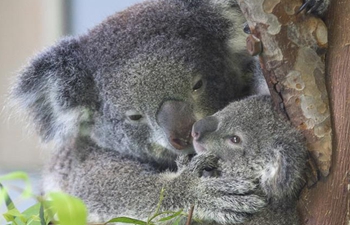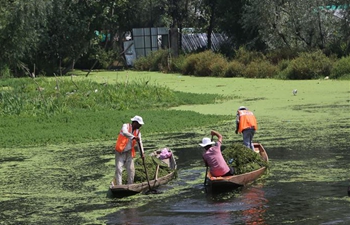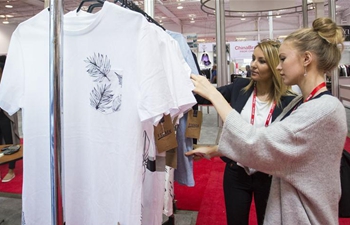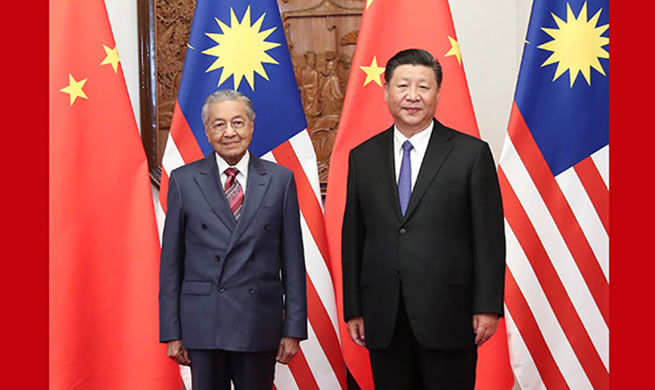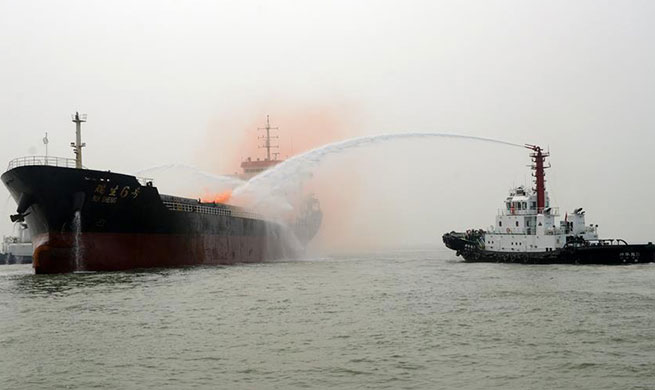by Charles Happell
CANBERRA, Aug. 21 (Xinhua) -- Australia's conservative government is braced for a period of turmoil following a leadership challenge to Prime Minister Malcolm Turnbull on Tuesday which revealed deep divisions within the ruling Liberal Party.
Turnbull survived the challenge from Home Affairs Minister Peter Dutton, but only just, 48 votes to 35.
Historically, that is the smallest margin of victory by an Australian prime minister facing his first internal leadership challenge, and will almost certainly embolden Dutton, and other senior MPs disillusioned by Turnbull's leadership style, to launch another bid, possibly as early as this week.
Political commentators in Canberra were portraying Turnbull's leadership as "terminally damaged" following Tuesday's dramatic events. Only seven of his supporters in the party room now need to change their mind, and switch to the Dutton camp, for the coup to be complete.
The Australian Broadcasting Corporation's long-serving pundit, Barrie Cassidy, predicted further resignations from other ministers unhappy with Turnbull's leadership. "There will be other resignations, and that just will add to the sense of chaos and crisis," Cassidy said on Tuesday.
Whatever happens in the next few weeks, Australian politics seems set for a period of upheaval.
In keeping with Westminster tradition, Dutton, as an unsuccessful leadership challenger, resigned his ministerial portfolio and will now head to the backbench.
There, he is not bound by any cabinet solidarity and can speak openly and freely about any issues he likes whether they're damaging to Turnbull or not.
On the backbench, he will be sitting alongside Tony Abbott, the former Liberal PM deposed by Turnbull in 2015, who is now apparently intent on avenging that defeat by destabilizing the PM whenever the opportunity presents itself.
Speaking on Tuesday afternoon after his resignation, Dutton said he was motivated to launch his challenge by the spectre of Labor leader Bill Shorten becoming the prime minister.
"I made a decision not because I had any animosity towards Malcolm Turnbull, I made a decision to contest this ballot because I want to make sure we can keep Bill Shorten from ever being prime minister of this country," Dutton said.
"I believe I had the best prospect of leading the Liberal Party to success at the next election. That was not to be today and I understand and I respect the outcome and I fully support the prime minister and the cabinet."
But, pointedly, he did not rule out another challenge to Turnbull.
In winning Tuesday's vote, 48-35, Turnbull was supported by just 58 percent of the party room.
To put those numbers into context, former Labor PM Julia Gillard won her first challenge from Kevin Rudd 71-31 (69.6 percent), but was defeated in the second ballot later on.
Another long-serving former Labor PM Bob Hawke, who won his first ballot 66-44 (60.0 percent) from challenger Paul Keating was defeated later in the second vote.
Earlier still, Liberal PM Malcolm Fraser won his challenge from Andrew Peacock 54-27 (66.7 percent), but lost the election the following year.
So the portents for Turnbull and his supporters are not good. There were murmurings from Dutton supporters on Tuesday afternoon that another challenge might be launched as early as Thursday.
The 35 people in the party room who voted for Dutton are led by the "conservative rebels", as they have coined themselves, including Abbott, Eric Abetz, Kevin Andrews and Andrew Hastie.
They represent an arch-conservative wing of the party, pitted against the more progressive thinkers such as Turnbull, deputy PM Julie Bishop and senior ministers Scott Morrison, Christopher Pyne and Mathias Cormann.
Dutton is a former Queensland policeman who is not afraid to speak his mind on many contentious social issues, including the treatment of asylum seekers, the immigration rate (which he thinks is too high), and law and order (which he'd like to tighten up).
But he only holds his seat of Dixon in southeastern Queensland by the barest of margins, so he is not guaranteed of his place in parliament, even if he does happen to win the Liberal leadership before the election. That situation just adds another layer of uncertainty to the federal political scene.
So what happens from here? There would seem to be three few options.
Turnbull may decide to visit the Governor-General and call an early election. While many would see that course of action as selfish, it may be the path of least resistance for the coalition. Winning the spill by just 13 votes is far from convincing, but for now at least Turnbull can claim majority support.
Such a move would appear to be futile. Even if he does head to the polls, his government looks doomed to failure.
The second option is that Turnbull looks to support a like-minded and loyal supporter to take the fight up to Dutton. That would be someone like Morrison, Bishop or even Cormann were he to run from the senate.
The third and final option would be for Turnbull to simply walk away and leave the prime ministership open. But this would leave Dutton with a free run at the PM's office and it's unlikely Turnbull want to reward his disloyalty by making it so easy for him.
These are the unpalatable alternatives facing Turnbull who only eight weeks ago was secure in his position and watching on as opposition leader Bill Shorten faced internal dissent of his own.
Now, though, their fortunes have been reversed in the most dramatic way, and it is Shorten who is short-priced favourite to lead the Labor Party to an historic win at Australia's next federal election.



